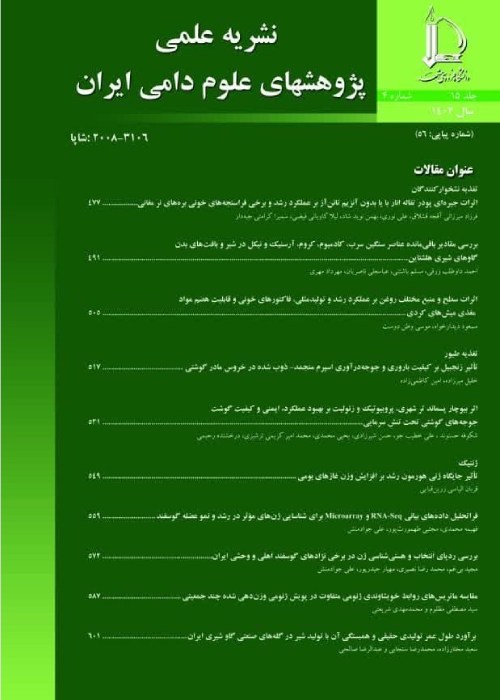Effect of different sources of organic and inorganic manganese on productive performance, antioxidant status, immune system and bone strength in aged laying hens (82 to 94 weeks)
As the highest cost of poultry production is the cost of feed, optimizing feed consumption and reducing feed conversion ratio are very important in the poultry industry. Also, the problem of lower egg shell quality caused by prolonged egg production period is an important issue affecting the breeding of old layer hens. Approximately 10% of the eggs produced in poultry farms are lost due to breakage of eggshells, which accounts for huge economic loss to the egg industry. Improving eggshell quality are essential for protection against penetrating of pathogenic bacteria. As a result, a great deal of efforts have been applied to improving egg shell quality in old laying hens in the fields of mineral nutrition. Numerous researchers have focused on the addition of trace elements in the diet to regulate egg quality by improving eggshell ultrastructure. Manganese is an indispensable trace element, Manganese takes a crucial part in biological processes, including the metabolism of lipid, protein, and carbohydrate. The low Mn content in corn–soybean meal diets used in production and the inefficient intestinal absorption of Mn in birds calls for the need for optimizing the supplemental provision of Mn to birds. In the process of egg formation, manganese is important for the formation of the shell and the pleasure affects the quality of the shell. Manganese is an important nutrient for laying hens. Dietary Mn is known to have profound effects on the skeleton. Manganese supplementation affects the function and characteristics of the tibia.
An experiment was conducted to investigate the effect of two inorganic and organic forms of manganese on performance, antioxidant activities, immune system and bone strength in older laying hens. 250 Leghorn laying hens (w-36) with 80 weeks of age were divided into 5 treatments and 5 replications in a completely randomized design. Treatments were: control (without manganese supplement), treatments containing 100% manganese sulfate (diet 1), 75% manganese sulfate and 25% organic manganese chelated (diet 2), 50% manganese sulfate and 50% organic chelated (diet 3) 25% sulfate Manganese and 75% organic chelated (diet 4). During the experiment, daily feed intake (g), egg weight, number and production of eggs (g/hen/day) and feed conversion ratio were calculated. To evaluate the humoral immunity on the day of slaughter (94 weeks age), 10 cc of blood was taken from two selected birds and its immunoglobulins were measured. To evaluate the bone strength, two pieces of chicken were selected from each replication and after slaughter, the tibia of the right foot was isolated and after preparation, the mechanical properties of the bones were measured. Also The antioxidant activities of SOD (Superoxide dismutase), DPPH (2,2-diphenyl-1-picrylhydrazyl) and MDA (malondialdehyde) were evaluated.
The results obtained in this experiment showed that the production performance was affected by experimental treatments. The lowest feed conversion ratio and the highest feed intake, egg production, egg weight and egg mass were observed in diets 4 and5, i.e. treatments receiving 50% and 75% manganese organic chelate. Also, the levels of immunoglobulin G and immunoglobulin M were significantly affected by experimental treatments. The levels of immunoglobulin G and immunoglobulin M in the experimental treatments showed a significant increase compared to the control treatment, while in immunoglobulin M there was no statistically significant difference between diet 3 and basal diet. In addition, antioxidant activity was significantly affected by experimental treatments. The amount of malondialdehyde was significantly reduced in diet treatments 4 and 5 compared to the control treatment. The percentage of DPPH (2,2-dipheny l-1-picrylhydrazyl) in diets 3, 4 and 5 showed a significant increase compared to the basal diet. Also, the amount of superoxide dismutase in diet 2 showed a significant decrease compared to other diets and control diet. However, the effects of inorganic and organic manganese supplements on the tibia strength of older laying hens were not affected by experimental treatments.
The results of this experiment showed that the addition of manganese supplement to the diet improves the production performance and immunoglobulin G and immunoglobulin M through the use of organic manganese source in laying hens and manganese amino acid chelate can replace 75% of manganese sulfate in the diet of older laying hens. Also, antioxidant status was significantly affected by experimental treatments. In general, the addition of manganese supplement in the diet of laying hens improves performance, immune system and antioxidant activity in aged laying hens.
- حق عضویت دریافتی صرف حمایت از نشریات عضو و نگهداری، تکمیل و توسعه مگیران میشود.
- پرداخت حق اشتراک و دانلود مقالات اجازه بازنشر آن در سایر رسانههای چاپی و دیجیتال را به کاربر نمیدهد.



